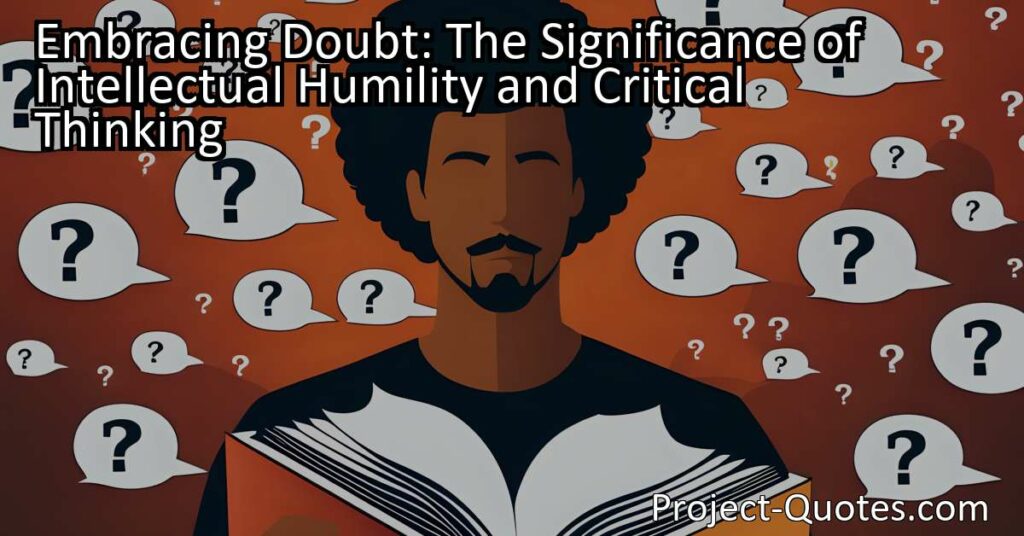I think we ought always to entertain our opinions with some measure of doubt. I shouldn’t wish people dogmatically to believe any philosophy, not even mine.
Bertrand Russell
Embracing Doubt: The Significance of Intellectual Humility and Critical Thinking Bertrand Russell’s wise words about entertaining doubt and nurturing intellectual humility resonate in both academia and our daily lives. By embracing doubt, we promote personal growth, foster empathy, and encourage respectful engagement with differing perspectives, leading to a more vibrant and enlightened society.
Table of Contents
- 1 I think we ought always to entertain our opinions with some measure of doubt. I shouldn’t wish people dogmatically to believe any philosophy, not even mine.
- 2 Bertrand Russell
- 3 Meaning of Quote – I think we ought always to entertain our opinions with some measure of doubt. I shouldn’t wish people dogmatically to believe any philosophy, not even mine.
- 4 Freely Shareable Quote Image
- 5 Related
Meaning of Quote – I think we ought always to entertain our opinions with some measure of doubt. I shouldn’t wish people dogmatically to believe any philosophy, not even mine.
In the vast realm of knowledge and thought, Bertrand Russell’s words resonate with wisdom and humility: “I think we ought always to entertain our opinions with some measure of doubt. I shouldn’t wish people dogmatically to believe any philosophy, not even mine.” These profound words remind us of the importance of intellectual humility and critical thinking, urging us not to blindly accept any belief or philosophy as an absolute truth. Instead, Russell encourages us to nurture a healthy skepticism, constantly questioning and examining our own beliefs and those of others.
At its core, Russell’s quote reflects the essence of the scientific methodan ever-evolving process of inquiry and discovery. Science operates on the premise that knowledge is provisional, subject to continuous revision and improvement. Similarly, when we approach our opinions with a measure of doubt, it opens doors to intellectual growth and fosters a deeper understanding of the world around us.
In a world where the information landscape is ever-expanding and often overwhelming, the significance of Russell’s advice cannot be overstated. With the rise of social media and echo chambers, it has become increasingly easy for individuals to become entrenched in their beliefs, impervious to alternative viewpoints or evidence challenging their perspective. This phenomenon, known as confirmation bias, inhibits personal growth and stifles intellectual discourse.
By embracing doubt and questioning our opinions, we free ourselves from the constraints of confirmation bias. We become receptive to new knowledge and open to dialogue with others who may hold differing views. Such intellectual humility is essential for a healthy democracy and a vibrant society, where constructive debates and collaborations lead to progress and innovation.
Entertaining doubt does not suggest that we should be perpetually indecisive or skeptical of everything. It is about striking a delicate balance, recognizing that no theory or philosophy is infallible and that even the most cherished convictions may need to be reevaluated in light of new evidence or logical reasoning. This approach ensures that our beliefs are grounded in reason, rather than blind faith.
Moreover, embracing doubt guards us against the dangers of intellectual complacency. When we become too attached to our ideas, we risk stagnation and miss opportunities for growth. Intellectual stagnation can turn our minds into stagnant ponds, devoid of innovation and creative thinking. By staying open to doubt and constantly seeking new knowledge, we nurture a mindset of lifelong learning, fueling personal and intellectual development.
Russell’s words also carry implications beyond the realm of philosophy and academic pursuits. They are a call to introspection and self-awareness. In our daily lives, we often encounter situations where our opinions clash with those of othersbe it in personal relationships, political discussions, or even mundane disagreements. By entertaining doubt, we cultivate empathy and respect for differing perspectives.
When we engage in discussions, rather than seeking to convince or convert others to our viewpoint, we approach them with curiosity and a genuine desire to understand. This empathetic approach fosters meaningful connections and enables us to find common ground by acknowledging the validity and complexity of diverse opinions.
While Russell encourages us to doubt our own convictions, he explicitly highlights the importance of not imposing our beliefs upon others. In a pluralistic society, it is crucial to respect individual autonomy and freedom of thought. The idea that our opinions should not be dogmatically believed, even by ourselves, emphasizes that intellectual diversity should be celebrated rather than suppressed.
In conclusion, Bertrand Russell’s quote serves as a powerful reminder of the significance of intellectual humility and critical thinking. By entertaining doubt, we embrace the spirit of inquiry and foster personal growth. Beyond philosophy, Russell’s words resonate in our daily lives, encouraging empathy and respectful engagement with differing perspectives. In a world often clouded by unwavering ideologies, these wise words evoke the spirit of intellectual openness and the quest for knowledge that lies at the heart of intellectual enlightenment.
I hope this quote inspired image brings you hope and peace. Share it with someone who needs it today!


